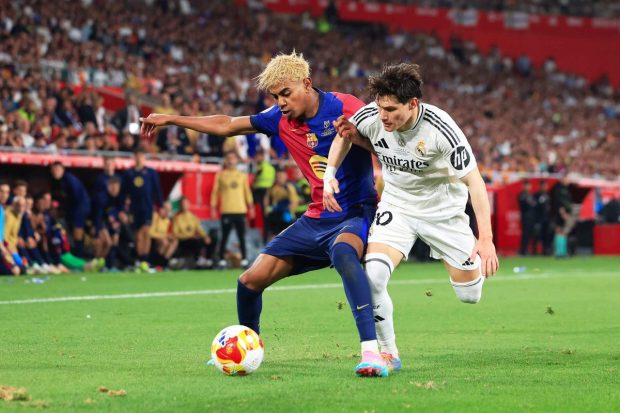

NEW YORK — Jayson Tatum says he lives a great life. The Boston Celtics star knows he makes a lot of money, takes care of his family, and experiences things most people can only dream of.
But with that comes a price. Expectations. Blame. Disappointment. A reality that others are constantly trying to distort because you either made their day or ruined it by living your life.
Advertisement
It’s why, after his losing turnover to end Game 2, Tatum threw himself under the bus. Everyone else was doing it, so he might as well join them. Why resist the tide when you can swim with the current?
“You just understand what comes with being that guy,” Tatum said after the Celtics won Game 3 Saturday 115-93, bringing the Knicks’ series lead to 2-1. “I get a lot of praise, I get a lot of credit, I get a lot of accolades, but I’m not perfect. And there’s times where I’ve needed to play better, I’ve needed to do more, and that’s what comes with being that guy.”
But once you’re the champion, you are unwittingly the bad guy. Hero to villain, just like that. It’s the nature of competition. As soon as the underdog becomes the top dog, their defeat is to some a triumph.
“So I always say, you’ve gotta be the same person when things are going great and when things aren’t going great,” Tatum said. “You can’t switch up. That’s the character of a good man.”
It’s why Celtics coach Joe Mazzulla laughed at the idea that the Celtics were in a bad place heading into Saturday. Sure, they had two difficult losses to a team they were widely predicted to beat. But Mazzulla doesn’t do despondency.
“You’ve got to tap into your darkness,” Mazzulla said. “So we’ve got to do it. That’s it.”
The Celtics’ conundrum was that they went down 2-0 to the Knicks because, regardless of so many things that deserve the blame, they simply missed wide-open 3s. Like, that’s it. They missed the easiest shots they’ll ever see and they did it too many times in a row in the biggest moments.
That shouldn’t happen to this team, but it does. The difference between this series and the 2023 Eastern Conference finals, when they went down 3-0 to the Miami Heat, was the understanding that they are not entitled to destiny. Fate would not make their shots suddenly go down.
Advertisement
“I’ve said it a thousand times, there’s no one way of how it’s supposed to go,” Mazzulla said. “You get caught up when your expectations aren’t met, and so there’s no expectations. We’re on a path of trying to go after greatness and you don’t get to dictate the test that’s in front of you.”
Mazzulla trains in Brazilian Jiu-Jitsu from an (almost) impossible position. He embraces starting with the disadvantage, working out of submission so that he is keenly aware that surrender is lurking the moment he loses trust in his process.
But there is a difference between refining and retreating.
The Celtics have to constantly grow and adjust to the reality of their competition. They live in an idealized version of themselves, of the sport itself. Hit more 3s than your opponent and somehow magically overcome whatever shortcomings linger.
It’s a widely discussed narrative because the intricacies of the game are a lot more complicated than reading the box score. But Occam’s razor exists to cut through narratives with a fine edge and it was right early on. The Celtics’ greatest strength and greatest flaw is their persistence. They brick 20 3s and they’ll brick 20 more if it’s the right shot. This series has made Mazzulla and his team think about what the word “right” means in their context.
Threes are not a monolith. There are different types of shots with different processes that build them. The same shot can feel different when a team is spamming them in transition instead of carefully creating them. Playing percentages is just gambling on chance, even when the odds are highly in your favor. Value does not equate process and Game 3 showed how the Celtics have responded through process.
“If you plan on doing this for a long time, trust me, it’ll be a lot worse than the last 72 hours, and that’s the perspective you have to have,” Mazzulla said. “This is the fun part. I didn’t get into the journey for it to be easy. It’s been dark, but in a good way.”
Advertisement
The Celtics’ identity has been wrapped up in maximizing advantages, in theory. It’s beyond the shots, to little things like only posting up smaller defenders because it’s easier to score or rebound. It’s avoiding difficult layups because those misses are the highest risk for surrendering a fast break going the other way.
This game was about letting go of that apathetic augmenting of opportunity so they can put their personality back into their play. That started with making the post-up an opportunity for passing rather than shooting.
“When you can dictate a sense of tempo by getting out to your spacing as (quickly) as possible, it’s easier to see the reads that are there, and we were deliberate in that tonight,” Mazzulla said. “Decent in the first two games, but it was better tonight.”
Though the Celtics have posted up Josh Hart and Mikal Bridges in this series, it was usually a second option after pursuing a cross-match onto Brunson. If they couldn’t get Brunson to switch, they would just accept they had to attack one of New York’s better defenders. But spending all that time trying to set up the matchup they wanted made it easier for the rest of the defense to prepare to help.
In Game 3, the Celtics didn’t waste time trying to ensnare Brunson, with Brown making it a point to get to the post quickly in transition against whatever matchup he had. Brown and Holiday turned it over on the first two Celtics post-ups of the game, but they were at least hammering the post up as soon as the play began. Then they figured out their spacing and how the Knicks defense was organized. Even when he actually got the cross-match on Brunson, Brown was operating more for the pass than the score.
“I don’t think anybody on our team or maybe even in the league can get into the paint like I can, especially when I’m moving and my body’s feeling the way it should be,” Brown said. “So that’s my goal: just to get in the paint, finish, make them help, make them collapse and then just find my guys for just open reads and play from there.”
When asked if his body was feeling the way it should be, Brown said it’s the playoffs but he’s focused on the next game. All the more reason to embrace the post-up as a passing opportunity.
Advertisement
“Today was just about making sure that we win, however that looks, whatever is needed,” Tatum said. “And our team is so talented and well put together, it can look different from night to night. You all know that. We’ve said that a million times, and we’ve proven that we can be successful doing that.”
Brown said the Celtics learn from their past mistakes without compromising the way they play. For all the qualms about who the Celtics are, their approach is proven. It doesn’t always work, but it’s designed to survive periods of failure. It’s built to outlast and this was the first sign in this series that it still works.
“You gotta beat us four times. That’s what it comes down to,” Brown said. “Not twice. Not once. Not three. You gotta win four games, so it’s a lot of basketball to be played.”
(Photo of Jayson Tatum: Al Bello/Getty Images)
This news was originally published on this post .








Be the first to leave a comment